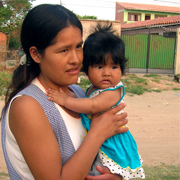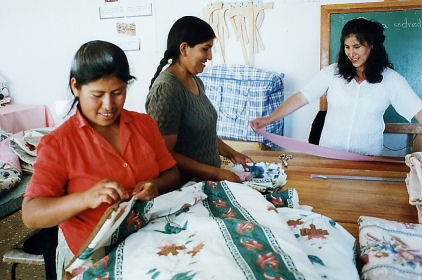Empowering women in Bolivia
El Alto is one of the youngest but also one of the poorest cities in Bolivia. Its inhabitants, made up manly of indigenous migrants from the countryside, have brought with them not only hope, but also a set of social problems. As an underprivileged part of the patriarchal society, women particularly suffer from the poor living conditions. Isabel Poma, director of the SOS Social Centre El Alto, talks about the help SOS Children is offering to women in the area.
The general situation of women in El Alto and Bolivia is rather difficult and complex and has not changed significantly over the last five years. Women continue to suffer from social exclusion, imposed by the oppressive patriarchal organisation of the country. In spite of the governments' promotion of women and their rights, the deficient working situation, the lack of education, as well as discrimination and sexual abuse mean that the majority of women continue to suffer.

The economy of mothers
Women in El Alto need a lot of help. The average working day of a woman in Bolivia is more than 15 hours. Besides taking care of the children and household, about 80% of mothers are also involved in the informal sector. Women sell goods at the city’s different street markets, which can earn between 10 to 20 Bolivianos (USD 1.2 - 2.5) per day. This on-the-side employment can earn them between 200 - 400 Bolivianos (USD 25 to 50) per month. In many cases, the mother’s and father’s income is nowhere near enough to cover basic needs like housing, food and education.
Working cooperatively for the development of women
SOS Children offers workshops aimed at improving the skills and self esteem of women. “Before I was very shy and didn’t have many friends. Taking part in the workshops of the Social Centre I changed a lot,” says 28-year-old mother Evia Rivero about her experience at the centre.

The SOS Social Centres cooperate with other organisations and public institutions, which provide women with loans to start a small business. The main problem, though, is that most women don’t have the basic skills or qualifications to run a business properly, especially the young ones. Since one of the requirements for a loan is to prove some sort of basic working skills, many women are refused the chance to improve their living conditions.
However, the workshops we offer at the Social Centre aim to provide these women with the skills and knowledge they need to run a business, enabling them to qualify for a loan and to start their own business. Our courses concentrate on different areas, including: indigenous Indian women's skirt making, the craft of macramé, cake making, and cleaning and domestic work techniques. But besides these skills, there is a lot more that the participating women take with them. Through our workshops and activities their perception of themselves is improved and they see that possibility of changing their personal and family life is achievable. Seeing themselves reflected in other women with similar experiences helps many of these women to address and their problems and make changes for the better.
Slowly, their abilities and self-esteem improve. They work towards personal development goals, which they can fulfil with the support of their friends and the SOS staff. These commitments range from paying the fees for their children on training programmes, to changing the way they present themselves, improving their living conditions - buying a bed so that their children can sleep separately, for example - or continuing to study. Little by little the women who take advantage of the opportunities begin to take control of their lives and their families. They develop skills to plan their time and their expenditure. Their commitments, which before were small and verbal, become life plans that help to direct them and are written down. Most of the women fulfil their commitments. Some do not, but the other women are always there encouraging them.